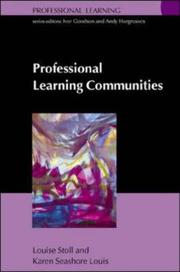| Listing 1 - 10 of 16 | << page >> |
Sort by
|
Book
ISBN: 9264097791 Year: 2011 Publisher: Paris : OECD Publishing,
Abstract | Keywords | Export | Availability | Bookmark
 Loading...
Loading...Choose an application
- Reference Manager
- EndNote
- RefWorks (Direct export to RefWorks)
Está diseñado para ayudar a los responsables de política educativa, los maestros y los grupos interesados pertinentes a analizar sus políticas y prácticas de liderazgo escolar actuales y desarrollar una comprensión común de dónde y cuándo tomar acción con base en las recomendaciones de política de la OCDE.
Book
ISBN: 9264084398 Year: 2010 Publisher: Paris : OECD Publishing,
Abstract | Keywords | Export | Availability | Bookmark
 Loading...
Loading...Choose an application
- Reference Manager
- EndNote
- RefWorks (Direct export to RefWorks)
La présente Boîte à outils est un outil de perfectionnement professionnel à l’usage des individus ou des groupes. Elle a été conçue pour aider les décideurs, les intervenants et les parties intéressées à analyser leurs politiques et leurs pratiques actuelles en matière de direction des établissements scolaires et à élaborer une conception commune de où et comment intervenir sur la base des recommandations formulées par l’OCDE dans Améliorer la direction des établissements scolaires.
Book
ISBN: 9264083502 Year: 2010 Publisher: Paris : OECD Publishing,
Abstract | Keywords | Export | Availability | Bookmark
 Loading...
Loading...Choose an application
- Reference Manager
- EndNote
- RefWorks (Direct export to RefWorks)
This Toolkit is a professional development tool for individuals or groups. It is designed to help policy makers, practitioners and relevant stakeholders to analyse their current school leadership policies and practices and develop a common understanding of where and how to take action based on the OECD Improving School Leadership policy recommendations.

ISBN: 0335192912 0335192904 Year: 1996 Publisher: Buckingham Open University Press
Abstract | Keywords | Export | Availability | Bookmark
 Loading...
Loading...Choose an application
- Reference Manager
- EndNote
- RefWorks (Direct export to RefWorks)
Educational change --- Effective teaching --- School improvement programs --- Improvement programs, School --- Instructional improvement programs --- Programs, School improvement --- School self-improvement programs --- School management and organization --- Instructional effectiveness --- Teaching effectiveness --- Teaching quality --- Teaching --- Teacher effectiveness --- Change, Educational --- Education change --- Education reform --- Educational reform --- Reform, Education --- School reform --- Educational planning --- Educational innovations --- School management

ISBN: 113571360X 0203162498 9780203162491 0203486412 9780203486412 9780750707145 0750707143 9780750706742 0750706740 0750706740 0750707143 9786610406159 9781135713553 9781135713591 9781135713607 Year: 1998 Publisher: London Falmer
Abstract | Keywords | Export | Availability | Bookmark
 Loading...
Loading...Choose an application
- Reference Manager
- EndNote
- RefWorks (Direct export to RefWorks)
The challenge of school improvement for failing schools is a complex and much debated issue. This text attempts to help those working in, or working with, failing schools and aims to contradict the notion that there are no quick fixes for schools in difficulty. The issue of failing schools is looked at from a number of viewpoints. Section one contains policy perspectives; section two contains three schools' perspectives; section three contains chapters written by three external facilitators; section four addresses the issues from three prominant school effectiveness researchers; and section five gives international perspectives from the co-ordinator of the OECD Combating School Failure initiative.
Educational leadership --- Educational productivity --- Education and state --- School improvement programs --- School management and organization --- Productivity, Educational --- Educational evaluation --- Educational accountability --- School management --- School Management And Organization --- School Improvement Programs --- Education And State --- Education
Article
Abstract | Keywords | Export | Availability | Bookmark
 Loading...
Loading...Choose an application
- Reference Manager
- EndNote
- RefWorks (Direct export to RefWorks)
What are the characteristics of a school as learning organisation? This paper should be seen as an attempt to work towards a common understanding of the school as learning organisation concept that is both solidly founded in the literature and is recognisable to all parties involved, i.e. educators, policy makers, parents and others alike. The paper provides an in-depth analysis of the learning organisation literature in general, and within a school context. It identifies and operationalises the characteristics of the school as learning organisation in an integrated model that consists of seven overarching ‘action-oriented’ dimensions: 1) developing and sharing a vision centred on the learning of all students; 2) creating and supporting continuous learning opportunities for all staff; 3) promoting team learning and collaboration among staff; 4) establishing a culture of inquiry, innovation and exploration; 5) establishing embedded systems for collecting and exchanging knowledge and learning; 6) learning with and from the external environment and larger learning system; and 7) modelling and growing learning leadership. The dimensions and underlying key characteristics are intended to provide practical guidance on how schools can transform themselves into a learning organisation and ultimately enhance student outcomes.
Article
Abstract | Keywords | Export | Availability | Bookmark
 Loading...
Loading...Choose an application
- Reference Manager
- EndNote
- RefWorks (Direct export to RefWorks)
What are the characteristics of a school as learning organisation? This paper should be seen as an attempt to work towards a common understanding of the school as learning organisation concept that is both solidly founded in the literature and is recognisable to all parties involved, i.e. educators, policy makers, parents and others alike. The paper provides an in-depth analysis of the learning organisation literature in general, and within a school context. It identifies and operationalises the characteristics of the school as learning organisation in an integrated model that consists of seven overarching ‘action-oriented’ dimensions: 1) developing and sharing a vision centred on the learning of all students; 2) creating and supporting continuous learning opportunities for all staff; 3) promoting team learning and collaboration among staff; 4) establishing a culture of inquiry, innovation and exploration; 5) establishing embedded systems for collecting and exchanging knowledge and learning; 6) learning with and from the external environment and larger learning system; and 7) modelling and growing learning leadership. The dimensions and underlying key characteristics are intended to provide practical guidance on how schools can transform themselves into a learning organisation and ultimately enhance student outcomes.

ISBN: 9780335220304 9780335230259 0335230253 1281129755 9781281129758 9780335220311 0335220312 0335220304 Year: 2007 Publisher: Maidenhead New York McGraw-Hill/Open University Press
Abstract | Keywords | Export | Availability | Bookmark
 Loading...
Loading...Choose an application
- Reference Manager
- EndNote
- RefWorks (Direct export to RefWorks)
Book
ISBN: 0854735011 9780854735013 Year: 1997 Publisher: London University of London, Institute of Education
Abstract | Keywords | Export | Availability | Bookmark
 Loading...
Loading...Choose an application
- Reference Manager
- EndNote
- RefWorks (Direct export to RefWorks)
School management --- School improvement programs --- Education --- Evaluation --- #PBIB:2001.1 --- School improvement programs - Great Britain --- Education - Great Britain - Evaluation

ISBN: 0729101940 Year: 1988 Publisher: London Open Books
Abstract | Keywords | Export | Availability | Bookmark
 Loading...
Loading...Choose an application
- Reference Manager
- EndNote
- RefWorks (Direct export to RefWorks)
#SBIB:022.TOND --- #SBIB:316.334.1O322 --- Doelen en functies van lager onderwijs
| Listing 1 - 10 of 16 | << page >> |
Sort by
|

 Search
Search Feedback
Feedback About UniCat
About UniCat  Help
Help News
News